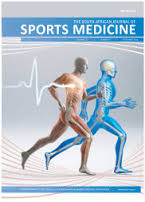Dietary supplements and beverages: Knowledge, attitudes, and practices among semi-professional soccer players in KwaZulu-Natal, South Africa
DOI:
https://doi.org/10.17159/2078-516X/2022/v34i1a14018Abstract
Background: The ingestion of dietary supplements and beverages is prevalent in soccer, at the amateur and professional level. The absence of professional advice at non-professional level makes amateur soccer players susceptible to ingesting unsafe supplements.
Objectives: To determine the knowledge, attitudes and practices of ABC Motsepe League (semi-professional) players in KwaZulu-Natal regarding the use of dietary supplements and beverages.
Methods: Three hundred and forty-three soccer players participated in a cross-sectional study. Knowledge, attitudes and practices were determined using a questionnaire. Researchers visited twelve teams. On the day of the visit to each team, information sheets and questionnaires were given to participants. Questionnaires were collected immediately following completion. Descriptive statistics were used, including means and standard deviations, where applicable. Inferential statistics, Chi-square and binomial tests were used to analyse the results. Statistical significance was set at p < 0.05.
Results: Sports beverages were the most recommended and commonly used, followed by energy beverages. Dietary supplements were the least-known used. Participants used beverages and dietary supplements to assist in providing more energy (67%), improve health (65%) and improve performance (55%) (p<0.001). Seventy-three percent of participants lacked knowledge about the anti-doping policy (p<0.001), with 87% having never attended a workshop on the safe use of supplements and beverages, or anti-doping awareness campaigns (p<0.001). Thirty-eight percent had not heard of the South African Institute for Drug-Free Sport (SAIDS), and 84% were not familiar with the yearly updated World Anti-Doping Agency’s (WADA) prohibited list (p<0.001). Of the 59% who did not take dietary supplements or beverages, 75% had insufficient information regarding them (p<0.001), 66% indicated that dietary supplements and beverages were costly (p=0.001), and 55% indicated they did not need dietary supplements and beverages (p=0.32).
Conclusion: There is a need for an educational programme on the safe use of dietary supplements, and sports and energy beverages among KwaZulu-Natal semi-professional soccer players.
Downloads
Downloads
Published
Issue
Section
License
Copyright (c) 2022 South African Journal of Sports Medicine

This work is licensed under a Creative Commons Attribution 4.0 International License.
The South African Journal of Sports Medicine reserves copyright of the material published. The work is licensed under a Creative Commons Attribution 4.0 (CC BY 4.0) International License. Material submitted for publication in the South African Journal of Sports Medicine is accepted provided it has not been published elsewhere. The South African Journal of Sports Medicine does not hold itself responsible for statements made by the authors.
How to Cite
- Abstract 744
- PDF 539






.png)